 Image search results - "oar" Image search results - "oar" |

Higashi Mito Station (on the way to Oarai)
|
|

Oarai StationShort ride from Mito Station.
|
|

Observation tower at the beach and a symbol of Oarai
|
|

Ferry port (service to Otaru, Hokkaido)
|
|

Sign saying Oarai is famous for noren curtains.
|
|

Wave breakers
|
|

Resort hotel
|
|
|

The beach
|
|

Oarai Isosaki Shrine's giant torii
|
|

Oarai Isosaki Shrine's giant torii
|
|

Oarai town
|
|

Oarai Isosaki Shrine torii at sea
|
|

Oarai Isosaki Shrine torii at sea
|
|

Oarai Isosaki Shrine torii at sea
|
|

Torii at sea
|
|

Shoreline
|
|

Isosaki Shrine torii as seen from the beach
|
|

Isosaki Shrine's second giant torii
|
|

Isosaki Shrine torii
|
|

Isosaki Shrine torii
|
|

Isosaki Shrine
|
|

Giant votive tablet (2006 is the year of the dog)
|
|

Shrine
|
|

Koma-inu lion dog and lanterns
|
|

Boat museum within the shrine grounds
|
|

Path from shrine
|
|

Seafood restaurants
|
|

Seafood restaurants
|
|

Anko seafood soup (miso-based)
|
|

Fresh oysters
|
|

Baby scallops
|
|

Ika squid
|
|

Dried fish
|
|

Train back to Mito.
|
|
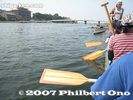
Rowing on the dragon boat
|
|

Nice new quadruple boat owned by the Takashima-Imazu Rowing Club NPO.
|
|

Held during the weekend in mid-March, the Sagicho Matsuri is a dramatic parade and clashing of 13 or 14 colorful Sagicho floats. On the first day at 1 pm, 14 Sagicho Festival floats gather at Himure Hachimangu Shrine near Hachiman-bori Canal.
|
|

The place is packed with people. Normally, it is a parking lot. The shrine is a few minutes by bus from Omi-Hachiman Station. MAP
|
|

From 2 pm, the procession starts and the floats start to exit the shrine. Also see the video at YouTube.
|
|

Float bearers make a circle and spin around while shouting "Cho-yare" or "Masse masse!"
|
|

In front of the torii gate, two floats join up.
|
|

On the first day (Sat.), the floats are paraded along the streets near the shrine and undergo judging for best design. The floats are works of art and made of edible materials mounted on a straw and wood base all to be set afire in the end.
|
|

They bond in friendship. These photos were taken on March 17-18, 2007, year of the boar.
|
|

Unlike the next day when the floats will clash with each other, here and within the shrine.
|
|

On Sat., the first day of the two-day festival, there is a procession from 2 pm. It is led by these shrine officials and the shrine priest on horseback.
|
|

Shrine priest on horseback and behind him on another horse is the mayor of Omi-Hachiman who serves as the Honorary Chairman of the Sagicho Festival.
|
|
|

Shrine officials followed by chigo children carrying red paper streamers.
|
|

Introduction of all Sagicho floats: Fourteen floats from various districts of Omi-Hachiman then paraded through a circular route. This is the Dai-ikku float. 第一区
|
|

It has a cherry tree, a red sake cup, and boar. Sagicho floats depict animals from the Oriental Zodiac, and 2007 was the Year of the Boar.
|
|
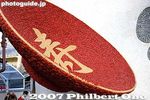
The sake cup has numerous little bead-like things. All edible.
|
|
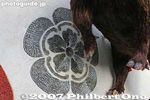
Numerous tiny fish heads make up this flower design.
|
|

Dai-niku float in front of Hakuunkan, a classic Western-style building, now a tourist info office and exhibition gallery. Also see the video at YouTube. Sagicho Festival, Omi-Hachiman. 第二区
|
|

Boar and peony.
|
|

Ao-nori (powery seaweed) was used to make the dark-green leaves.
|
|

Sometimes a float collapses when float bearers get too tired.
|
|

Sanwakai float. 参和会
|
|

This is a Takara-bune (Treasure Boat) design.
|
|

The boar's mane is made of tiny fish. You can smell the seafood. I'm surprised that crows never swooped down on the floats to feast on them.
|
|

Notice the Treasure Boat.
|
|

Suwai-cho float. 仲屋町
|
|
|

Small mushrooms
|
|

Small silvery fish, beans, and perhaps onions. Looks like very painstaking work. Sagicho Festival, Omi-Hachiman, Shiga.
|
|

Ishin-cho float. 為心町のだし
|
|

This float won 2nd place.
|
|

This has a chrysanthemum design which is the Imperial family crest. To celebrate the newborn prince.
|
|
|
|

Miyauchi-cho float. 宮内町のだし
|
|
|

This design won 3rd place. White sugar is one of the ingredients.
|
|

The float returns to the shrine.
|
|

Uwai-cho float. 魚屋町のだし
|
|
|

Looks like ao-nori (seaweed powder).
|
|
|
|

Shinmachi-dori float. 新町通りのだし
|
|

Shinmachi is where the Omi shonin merchants lived.
|
|
|

Tapioca, chewing gum, rock salt, and dried cuttlefish are among the edible materials here.
|
|

Shinmachi-dori Children's float passing through Shinmachi, Omi-Hachiman's old merchants quarters. 新町通りこども
|
|
|

Sea turtle and "tancho" crane are auspicious symbols.
|
|
|
|

Shichikukai float. 紫竹会のだし
|
|
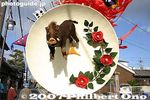
Peony dish design.
|
|
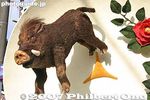
The yellow thing is made of corn.
|
|

Peonies
|
|

Another Shichikukai float, but for children.
|
|

Ball made of candy.
|
|

Spectators in front of Hakuunkan watch the floats. Local police estimate 38,000 people came to see the festival this day.
|
|

Many homes hang red streamers during the Sagicho Festival.
|
|

Honmachi float leaving Himure Hachimangu Shrine. Sagicho Festival, Omi-Hachiman, Shiga. 本町のだし
|
|

Each float also has someone with wood clappers.
|
|
|

Black rice, beans, and more.
|
|

Ikeda-machi float. 池田町のだし
|
|

Folding fans
|
|

Tiny fish form the pine tree design on the fans.
|
|

Looks like bread crust.
|
|

Jukku-kai float. 十区会
|
|

Hanafuda playing cards.
|
|

Deer seems to have some sort of candy shavings.
|
|
|
|

Dai-Juikku float. 第十一区
|
|
|

This float won the top prize for float design.
|
|

Life-like boar, all edible materials.
|
|
|
|

Dai-Juikku also has a small float for kids.
|
|
|
|
|

On the second day of the festival, the floats clash with each other. Sagicho floats pass through the torii of Himure Hachimangu Shrine, near Hachiman-bori Canal.
|
|

The following photos were taken on the second day of the festival. On the festival's 2nd day (Sun.), the floats are paraded from 10:30 am and arrive at the shrine by 2 pm.
|
|
|
|